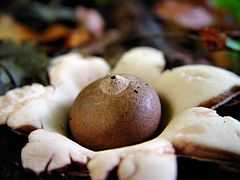Geastrales
| Earthstars | |
|---|---|
 | |
| Geastrum triplex | |
| Scientific classification | |
| Kingdom: | Fungi |
| Division: | Basidiomycota |
| Class: | Agaricomycetes |
| Subclass: | Phallomycetidae |
| Order: | Geastrales K.Hosaka & Castellano (2007)[1] |
| Family: | Geastraceae Corda (1842)[2] |
| Type genus | |
| Geastrum Pers. (1801) | |
| Genera | |
|
Geasteroides | |
| Synonyms[3] | |
|
Sphaerobolaceae J.Schröter (1889) | |
The Geastrales are an order of gasterocarpic basidiomycetes (fungi) that relates to Cantharellales. The order contains the single family Geastraceae, commonly known as "earthstars". It includes the genera Geastrum and Myriostoma. About 64 species are classified in this family, divided among eight genera. Older classifications place this family in the order Lycoperdales, but more recently they had been placed in Phallales.[4] As of 2010, the family is classified as the sole taxon in the Geastrales order.[5]
One member of the Geastraceae, Sphaerobolus stellatus—a nuisance organism in landscapes known as "shotgun fungus" or "cannonball fungus"—colonizes wood-based mulches and may throw black, spore-containing globs onto nearby painted surfaces.
The fruit bodies of several earthstars are hygroscopic: in dry weather the "petals" will dry and curl up around the soft spore sac, protecting it. In this state, often the whole fungus becomes detached from the ground and may roll around as a tumbleweed does. When the weather dampens, the "petals" moisten and uncurl and some even curl backward lifting the spore sac up. This then allows rain or animal movement to hit the spore sac so it will puff out spores when enough moisture is present for them to germinate.
References
- ↑ Hosaka K, Bates ST, Beever RE, Castellano MA, Colgan W 3rd, Domínguez LS, Nouhra ER, Geml J, Giachini AJ, Kenney SR, Simpson NB, Spatafora JW, Trappe JM. (2006). "Molecular phylogenetics of the gomphoid-phalloid fungi with an establishment of the new subclass Phallomycetidae and two new orders". Mycologia 98 (6): 949–59. doi:10.3852/mycologia.98.6.949. PMID 17486971.
- ↑ Corda ACJ. (1842). Icones fungorum hucusque cognitorum (in Latin) 5. Prague: J.G. Calve. pp. 1–92 (see p. 25).
- ↑ Kirk et al. (2008), p. 648.
- ↑ Kirk PM, Cannon PF, David JC, Stalpers JA. (2001). Ainsworth & Bisby's Dictionary of the Fungi (9th ed.). Oxon, UK: CABI Bioscience. p. 205. ISBN 0-85199-377-X.
- ↑ Kirk PM, Cannon PF, Minter DW, Stalpers JA. (2008). Dictionary of the Fungi (10th ed.). Wallingford, UK: CAB International. p. 274. ISBN 9780851998268.
External links
| Wikimedia Commons has media related to Geastraceae. |